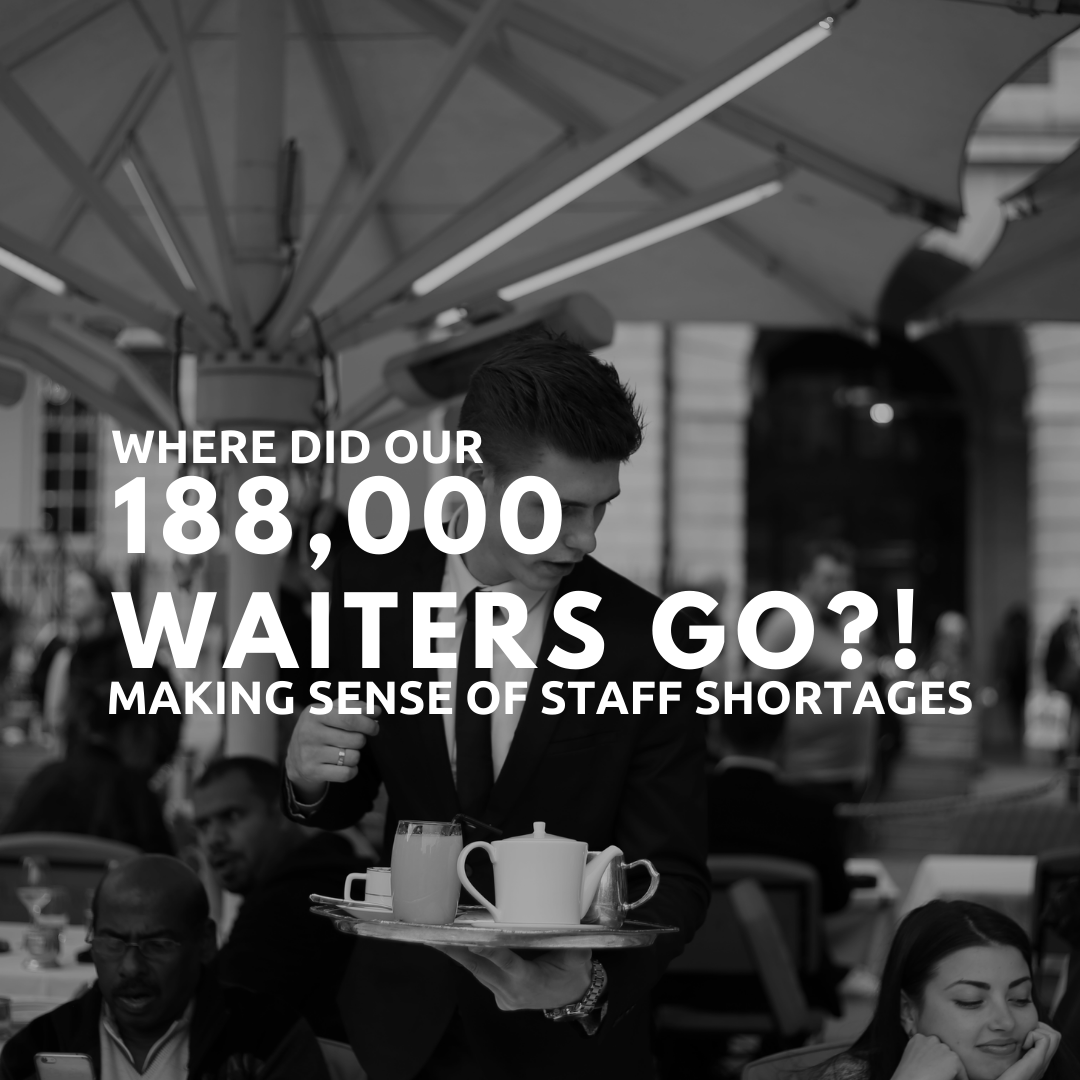The Damage is Done – Which Way Now?
Staffing in the UK world of hospitality and seasonal workers finally had its wake-up call. The perceived, perennial culture of long hours, low wages and low unionisation has been ripped apart. The slow-motion, double car crash of the pandemic and then Brexit has shattered many working lives. To the ideal mind this could be seen as a fresh start however with ever leaner margins this now seems unrealistic.
Problems backed up thick and fast for publicans and restaurateurs alike. Hospitality staffing fell prey to a complex, unforeseen series of factors. From up and down the land we heard reports of furloughed staff, suddenly with plenty of time on their hands to search on the internet. For the first time they could gauge the sacrifices they had been making and reflect on whether the hours and stress were worth it. Many decided they were not and found easy vacancies in logistics, telesales, and deliveries.
Pubs, restaurants and hotels bear the brunt
In Clerkenwell, the Italian restaurant, Luca, echoed this experience and it still struggles to this day. Owned by the trio behind Michelin-starred the Clove Club, the restaurant has had to close all day Sunday, Monday, and Tuesday. A considerable cut from the previous six days a week, pre-pandemic. Co-owner, Daniel Willis, said: ‘The staffing crisis is out of control. Never known anything like it. Simply did not have enough people in the kitchen to do six days.”
Elsewhere the pain from employing foreign workers was rife. Claire Harvey, owner of Pierre Victoire restaurant in Oxford, described feeling crucified by the second lockdown: ‘Being a French restaurant, we employed French, Spanish & Italian staff. They went home to be near their families and because you have to be resident on the 31 December to apply for settled status they can't come back now.’
The sobering statistics from the end of lockdown on June 21 highlighted the extent of the problem. A total of 188,000 hospitality vacancies, which made up a staggering 43% of the total national vacancies resulting from the pandemic. Overall, 1.3 million foreign workers left the UK during the pandemic. Interestingly, not all the workers returned to their home country. Many chose to settle in other European countries, with Germany ranking high, where they felt the surety of an EU country offered more security.
Fruit and veg feel the pain too
It is not just hospitality that has felt the full force of the virus and Brexit. Fruit and vegetable growers have been snared in the same trap too. Tim Clarke, who runs his own vegetable farm near Chichester, relied on seasonal pickers from Eastern Europe prior to Covid. This year he only managed to hire 75% of the 50 workers he needs. ‘The whole thing is ludicrous.’ Clarke said. ‘We already sold the product to supermarkets and they’re complaining because they’re not getting it.’
Recently a total of 85% of hospitality businesses said they were struggling to fill vacancies. Wages have been forced higher as an incentive, with some waiters in the south-east now earning £15ph, equivalent to £30,000pa full time. However, feedback appears inconsistent with another bar owner saying he did not get a single reply for a bar worker position he advertised at a salary of £22,000pa.
Looking forward – how the land lies
So, it seems wage incentives are likely to be part of the solution but what other initiatives are forthcoming. Already hospitality organisations such as Springboard UK have stepped up to the plate. Chief executive, Chris Gamm says: ’With a much tighter economy and shrinking headcounts, employers will be looking for experienced people who know the industry and can hit the ground running; people who need less supervision and nurturing.’ Springboard UK nurtures young people into careers in employment in hospitality, leisure, and tourism. Their current initiative is to have 10,000 young people trained and ready for work, in line with the industry’s recovery, by 2022.
Meanwhile, National Secretary of the GMB union, Andy Prendergast, suggested the pandemic has just exacerbated the problems caused by Brexit. He sees a future where: ‘Employers need to work with unions to deal with long established issues within the industry, such as the perceived lack of status, lack of career opportunities and unsocial hours, to create a more attractive career for workers.’ It is not the first time such sentiments have been expressed before about hospitality and it remains to be seen if they will be followed through.
At industry body, UK Hospitality, CEO Kate Nicholls, suggested it was time for the government to review its "shortage occupations" list to include hospitality workers from abroad. She explained: ‘We've also suggested an Australian-style coronavirus recovery visa for lower-skilled workers, who don't meet the point-based system but who are crucial to the recovery.’
UK Hospitality has also teamed up with Mayor of London, Sadiq Khan, & DWP.
Khan has called on ministers to change the ‘damaging’ changes to visa rules following Brexit and is willing to use his own skills academy programme to train new staff.
UK hospitality will be running sessions in partnership with Job Centre plus work coaches across the country. Kate Nicholls again: ‘We are delighted to be working with the government to restore confidence in a sector which is a stable employer for millions of skilled and unskilled workers across a wide range of diverse roles, and which can play a constructive role in tackling unemployment.’
Paul Askew, chef patron of The Art School restaurant and joint chair of Liverpool Hospitality Association, raised the possibility of immigration visas based on need and demand. He said:
‘Without the staff and the recruitment, I think we have to look at changing immigration law. So, when there was a need for qualified people, like there was in the NHS, nurses came from all over the world. I would hope that the government can now see that it's incredibly urgent and that we absolutely incentivise hospitality professionals from across Europe to come here.’
So clearly a lot of practical plans are coming to fruition, and whether by incentivised immigration with visas, upskilling or better wages and conditions, any or all these initiatives will get the numbers back into hospitality. One positive offshoot of the staffing crisis has been the proliferation of dark kitchens. With their skeleton business models and minimal staffing requirement they have flourished, with increases of 100% in the North and an average increase of 27% across London throughout the pandemic.
Tony Wilson, Director of the Institute of Employment Studies, summarised his outlook and suggested that businesses will need to pay more attention to how they recruit, train, and treat staff. He also suggested accepting less experienced staff and training them, while offering more support to those with health conditions or caring responsibilities. ‘It’s not necessarily about pay. It's about offering better terms.’ Wilson added. ‘Employers haven't had to do that for a decade.’
This year, with a beacon of hope, the governor of the Bank of England gave an optimistic economic forecast for this year. He views current growth as a ‘bounce back’ rather than a short-lived boom. He did caution that this optimism must be seen in the perspective of two years no growth. With the news today of the removal of all Coronavirus restrictions by the 19th July everything lies in the balance for the hospitality sector.
References:
https://www.bbc.co.uk/news/uk-england-oxfordshire-57638103
https://www.bbc.co.uk/news/business-57400560
https://london.eater.com/22527438/restaurant-staff-shortage-jobs-london-brexit-covid-19
https://www.business-live.co.uk/retail-consumer/hospitality-facing-perfect-storm-covid-20768397
https://www.independent.co.uk/news/business/brexit-covid-hospitality-staff-shortage-b1872132.html
https://www.bbc.co.uk/news/business-57008220
https://www.bbc.co.uk/news/business-57218978
https://www.london.gov.uk/what-we-do
https://www.gov.uk/youth-mobility
https://www.employment-studies.co.uk/staff/tony-wilson
The Sunday Times 4/7/2021

